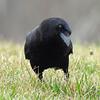Take a photo of a barcode or cover
Going in, I was aware that the comparison this book makes is considered controversial by some. Those people are the ones that I believe would most benefit from reading Eternal Treblinka. (If they don't read the book in it's entirety, I beg them to read the series of essays by Holocaust touched individuals who are active in animal rights.)
This was a truly enlightening book. That's all I can really say, short of just copy and pasting quotes from the book. Which wouldn't be too difficult, considering how many passages and quotes I have highlighted and marked.
Just excellent.
This was a truly enlightening book. That's all I can really say, short of just copy and pasting quotes from the book. Which wouldn't be too difficult, considering how many passages and quotes I have highlighted and marked.
Just excellent.
I feel a little bad giving this book 3 stars, because I did find it very interesting. I was however expecting it to be more about the treatment of animals, and less about animal activists.
The last 3 chapters consisted solely of the stories of animal activists, which got a bit much after a while. I would have like to read more about animal welfare and treatment, and arguments for the similarity between the holocaust and animal suffering, and why it is bad, as I thought that was the premise of the book.
The last 3 chapters consisted solely of the stories of animal activists, which got a bit much after a while. I would have like to read more about animal welfare and treatment, and arguments for the similarity between the holocaust and animal suffering, and why it is bad, as I thought that was the premise of the book.
dark
informative
sad
medium-paced
The title of this book is one that can quickly turn someone off to reading it but the content is absolutely important. It does an excellent job highlighting how US eugenics movements and the implementation of assembly lines for product production and nonhuman animal exploitation inspired and was used as a model for what was done to humans. The first half is a bit of a theory and history lesson and the last half is Jewish folks from a variety of backgrounds discussing how animals fit into their understanding of this topic.
challenging
dark
emotional
informative
inspiring
reflective
sad
medium-paced
I feel a little bad giving this book 3 stars, because I did find it very interesting. I was however expecting it to be more about the treatment of animals, and less about animal activists.
The last 3 chapters consisted solely of the stories of animal activists, which got a bit much after a while. I would have like to read more about animal welfare and treatment, and arguments for the similarity between the holocaust and animal suffering, and why it is bad, as I thought that was the premise of the book.
The last 3 chapters consisted solely of the stories of animal activists, which got a bit much after a while. I would have like to read more about animal welfare and treatment, and arguments for the similarity between the holocaust and animal suffering, and why it is bad, as I thought that was the premise of the book.




